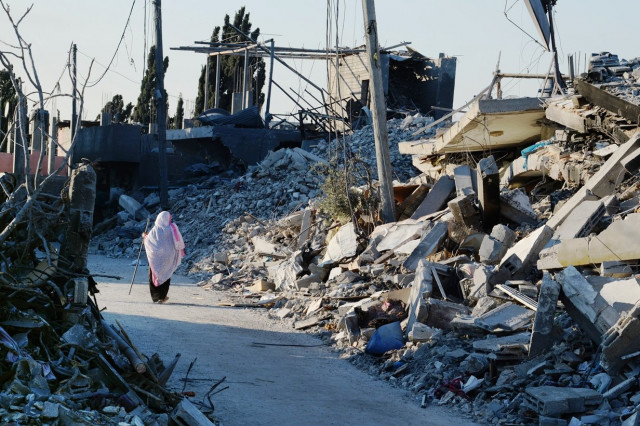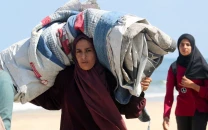UN calls on Israel, Palestinians to prosecute Gaza war crimes
Israel denounced the resolution as an "anti-Israeli manifesto."

In the 50-day war, more than 2,100 Palestinians were killed, mostly civilians. Israel put the number of its dead at 67 soldiers and six civilians. PHOTO: AFP
The 47-member UN Human Rights Council adopted a resolution, presented by Muslim states, by a vote of 41 to one, with five abstentions.
Israel's closest ally, the United States, was the only country to vote against. While the Council has no binding powers, its moral authority raises the pressure on both sides to hold accountable perpetrators of killings of civilians and other violations.
Israel denounced the resolution as an "anti-Israeli manifesto."
Prime Minister Benjamin Netanyahu criticised the council, suggesting it was singling out his country when it should be focusing on the actions of Syrian President Bashar al-Assad or the militants of Islamic State, also known as ISIS.
"On the day on which Israel was fired at from Sinai, and at a time when ISIS is committing vicious terrorist attacks in Egypt, as Assad slaughters his people in Syria and as the number of arbitrary executions per annum climbs in Iran, the UN Human Rights Council decides to condemn the State of Israel for no fault of its own, for acting to defend itself from a murderous terrorist organisation.”
The debate was held days before the first anniversary of Israel launching "Operation Protective Edge" in response to rockets fired by militants from the Hamas-ruled Gaza Strip.
In the 50-day war, more than 2,100 Palestinians were killed, mostly civilians. Israel put the number of its dead at 67 soldiers and six civilians. Israeli air strikes and shelling hammered the densely populated Gaza Strip, dominated by the Islamist Hamas movement, causing widespread destruction of homes and schools.
Hamas and other militant groups launched thousands of rockets and mortar bombs out of the enclave into Israel. UN investigators issued a report on June 22 that Israel and Palestinian militant groups committed grave abuses of international humanitarian law during the conflict that may amount to war crimes.
US 'troubled'
After hours of behind-the-scenes negotiations, all European Union member states of the Council, including Britain, France and Germany, voted in favour of the resolution.
"Israel and Palestine, as well as Hamas, should respect the resolution's call to cooperate with the International Criminal Court," New York-based Human Rights Watch said in a statement.
The Palestinian Authority joined the court, based in The Hague, in April, a move deeply opposed by Israel.
The ICC prosecutor has begun a preliminary examination.
Palestinian Ambassador Ibrahim Khraishi said the government had set up an independent committee on Thursday to probe allegations, and it would respect its legal obligations. In Geneva, Israeli Ambassador Eviatar Manor said: "Israel is fully committed to investigating all alleged violations of laws of armed conflict."
Explaining his country's 'no' vote, US ambassador Keith Harper said: "We are troubled that this resolution focuses exclusively on alleged Israeli violations without any express reference to Palestinian violations."
Britain's ambassador Julian Braithwaite said: "Israel has the right to defend itself against indiscriminate attacks. But it is a principle of international humanitarian law that the use of force in self-defence must be proportionate."






1701351241-1/Afghan-refugees-(3)1701351241-1-208x130.webp)












COMMENTS
Comments are moderated and generally will be posted if they are on-topic and not abusive.
For more information, please see our Comments FAQ